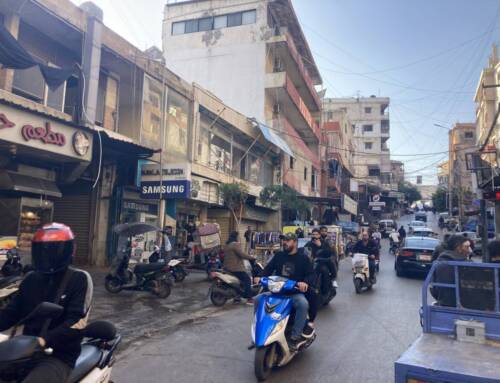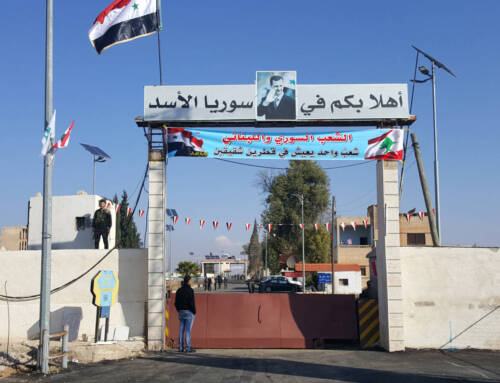Three months after the Bsharre incident, over 300 Syrian families are still paying for the crime of one person
As the news of the killing spread in the village, a mob ransacked Syrian homes; 1,592 Syrians fled overnight
23 February 2021
The mountainous town of Bsharre, in northern Lebanon, 02/08/2020 (Silvia Mazzocchin)
BEDAWWI — In a decade of war in Syria, Nora was displaced ten times. The 42-year-old woman dodged death as bombs fell within earshot multiple times, fleeing between Idlib, where she lived with her husband – now disappeared – and Damascus, her city of origin. “In Idlib, we stayed three years under the bombs; we slept under olive trees, without knowing what would happen to us,” she said.
A year and a half ago, Nora fled to Lebanon to join her two adult children in Bsharre, an idyllic mountainous town in northern Lebanon. “I was able to sleep and rest psychologically. In Syria, we were always afraid that if we go to sleep, we will not wake up,” she said. Nora worked as a babysitter for the neighbors and described the village’s atmosphere as “nice.”
But three months ago, on November 23, 2020, M.H., a Syrian national allegedly killed Joseph Tawk, a Lebanese national from Bsharre. The Syrian man confessed his crime to the Internal Security Forces and was found to possess a gun illegally.
As the news spread in the village, a mob ransacked Syrian homes; 1,592 Syrians fled overnight, and thirteen Syrians required medical care – covered by UNHCR – due to their injuries, UNHCR told Syria Direct.
“I don’t know the man that created the problem, but all Syrian families had to pay for the action of one man; how is it related to us?” Nora asked.
Bsharre is the hometown of Samir Geagea, the leader of Lebanese Forces, a political party known for its anti-refugee and anti-Assad stands. In 2014, Bsharre, like many Lebanese municipalities, decreed a curfew for Syrian refugees. In 2017, protests erupted demanding the eviction of Syrians.
Lebanon, the country with the most refugees per capita globally, received $991.3 million in 2020 under the Lebanese Refugee Response Plan – but that is only 34% of the required $2,656.5 million.
After the killing of Tawk last November, Bsharre’s mayor demanded Syrians “living illegally” leave the town. Sixty-nine percent of Syrian households in Lebanon lack legal residency. “For Syrian refugees, the system to obtain residency is unbelievably difficult; it is another example of the coercive environment,” said Nadia Hardman, a researcher in the Refugee and Migrants Rights Division of Human Rights Watch (HRW).
“Actions of one refugee should never impact the enormity of the community. The idea of uprooting their life when they have already faced such hardship and trauma because they are refugees is not acceptable,” Hardman pointed out.
“We fled the same night”
On a sunny February morning, Nora, Sara and Fatima reflected over coffee how the Bsharre crime had turned their lives upside down. The three Syrian women are registered with UNHCR but lack residency and now live in al-Bedawwi Camp, five kilometers north of Tripoli.
On the day of the incident, Fatima was at her house when someone told her a Syrian had killed a Lebanese. “We thought this was none of our business, but then our neighbors told us to get out of the house quickly because a mob was searching for Syrians and beating them,” the 27-year-old recalled. Fatima and her husband, son and sister-in-law left the same night, ending their nine years in Bsharre abruptly.
Nora was also at home when she heard an unusual ringing of church bells; then she heard the banging on her door. “They broke into the house, but I hid; I made my kids silent and turned off the light, so they did not find us,” she explained. At 7 pm, she and her kids hopped into a pick-up truck and tried to enter several villages, “but they did not let us in; they said they could not guarantee our safety.” At 2 am they arrived in Tripoli.
Sara and her five children, aged between 5 and 15 years old, also left Bsharre the same day and for two days did not find a place to sleep until Fatima’s husband offered help. This 36-year-old woman from Idlib had lived with her children in Bsharre for four years; her husband is in Syria.
On the first days after the Bsharre incident, Syrians stood in front of the UNHCR Tripoli office demanding solutions. “I presented a complaint at UNHCR. They told us they will help, but I need to wait,” Nora said.
Nora and Fatima each received LBP 450,000 from the NGO Solidarités International. Nora also received LBP 450,000 from the Norwegian Refugee Council, and Fatima was given furniture by a local NGO. But the three women complained of the lack of response by UNHCR.
UNHCR informed that 185 families received emergency cash assistance after the incident.
An uphill battle to rebuild a life
Like many of the Syrians that fled Bsharre, Nora was first hosted in the house of a relative in Tripoli. Then she decided to go with her children to a refugee camp in northern Akkar province, but they only stayed one night. “My kids were trembling in the cold,” she said.
Now she lives in Jabal al-Bedawwi, together with Sara’s family and a third family; in total, they are 22 people in a house that costs LBP 600,000 per month. Fatima lives with her family in a home for LBP 360,000. The women said UNHCR had offered them ‘shared accommodation,’ but they refused because it is against their social norms to share a house with unknown people.
Out of the 338 affected families, 22 were provided “shelter units,” and four families who moved to sub-standard buildings “were referred for shelter rehabilitation and support,” according to UNHCR.
Fatima’s husband used to work in the fields in Bsharre; now, he does daily jobs in Tripoli. Sara and her five children receive LBP 600,000 per month from UNHCR, but she spends LBP 400,000 on rent alone. “We have LBP 200,000 for other expenses; it is not enough even for bread,” she said.
“God knows how much I have borrowed from the relatives of my husband,” Nora said. Nine out of ten Syrian households in Lebanon are in debt.
Half of Syrian refugee families in Lebanon are food insecure, and the percentage is far higher for female-headed households (68%) than male-headed households (13%). Nora’s husband disappeared and Sara’s husband is in Syria. Both women explained that their children work on the streets, selling tissues or rummaging through garbage for plastic bottles to sell, “just so we can buy bread,” Nora said. Child labor among Syrian refugees in Lebanon rose from 2.6% to 4.4% in 2020.
Despite the difficulties adjusting to life in Tripoli after being uprooted from Bsharre, the women said that they don’t know any Syrian family that decided to return to Bsharre. But to UNHCR’s knowledge, 13 Syrians returned in mid-December due to work commitments and currently 220 Syrian refugees reside in the town.
For Fatima, though, the return is not an option. “We cannot go back to Bsharre. There is no security for us; we are afraid.”
*For security concerns, the three Syrian women quoted in this report asked that their names be concealed.







